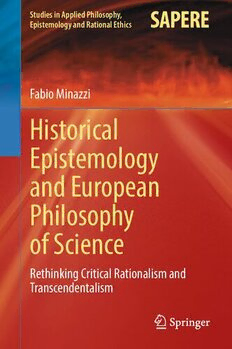
Historical Epistemology and European Philosophy of Science: Rethinking Critical Rationalism and Transcendentalism PDF
Preview Historical Epistemology and European Philosophy of Science: Rethinking Critical Rationalism and Transcendentalism
Studies in Applied Philosophy, Epistemology and Rational Ethics Fabio Minazzi Historical Epistemology and European Philosophy of Science Rethinking Critical Rationalism and Transcendentalism Studies in Applied Philosophy, Epistemology and Rational Ethics Volume 62 Editor-in-Chief LorenzoMagnani,DepartmentofHumanities,PhilosophySection,Universityof Pavia,Pavia,Italy EditorialBoard AtochaAliseda,UniversidadNacionalAutónomadeMéxico(UNAM),Mexico, Mexico GiuseppeLongo,CNRS-EcoleNormaleSupérieure,CentreCavailles,Paris, France ChrisSinha,SchoolofForeignLanguages,HunanUniversity,Changsha,China PaulThagard,UniversityofWaterloo,Waterloo,Canada JohnWoods,UniversityofBritishColumbia,Vancouver,Canada Studies in Applied Philosophy, Epistemology and Rational Ethics (SAPERE) publishes new developments and advances in all the fields of philosophy, epistemology, and ethics, bringing them together with a cluster of scientific disciplines and technological outcomes: ranging from computer science to life sciences, from economics, law, and education to engineering, logic, and mathe- matics,frommedicinetophysics,humansciences,andpolitics.Theseriesaimsat covering all the challenging philosophical and ethical themes of contemporary society, making them appropriately applicable to contemporary theoretical and practical problems, impasses, controversies, and conflicts. Our scientific and technological era has offered “new” topics to all areas of philosophy and ethics – forinstanceconcerningscientificrationality,creativity,humanandartificialintelli- gence, social and folk epistemology, ordinary reasoning, cognitive niches and culturalevolution,ecologicalcrisis,ecologicallysituatedrationality,consciousness, freedom and responsibility, human identity and uniqueness, cooperation, altruism, intersubjectivityandempathy,spirituality,violence.Theimpactofsuchtopicshas been mainly undermined by contemporary cultural settings, whereas they should increasethedemandofinterdisciplinaryappliedknowledgeandfreshandoriginal understanding. In turn, traditional philosophical and ethical themes have been profoundly affected and transformed as well: they should be further examined as embeddedandappliedwithintheirscientificandtechnologicalenvironmentssoto update their received and often old-fashioned disciplinary treatment and appeal. Applying philosophy individuates therefore a new research commitment for the 21st century, focused on the main problems of recent methodological, logical, epistemological, and cognitive aspects of modeling activities employed both in intellectualandscientificdiscovery,andintechnologicalinnovation,includingthe computational tools intertwined with such practices, to understand them in a wide and integrated perspective. Studies in Applied Philosophy, Epistemology and RationalEthicsmeanstodemonstratethecontemporarypracticalrelevanceofthis novel philosophical approach and thus to provide a home for monographs, lecture notes,selectedcontributionsfromspecializedconferencesandworkshopsaswellas selectedPh.D.theses.Theserieswelcomescontributionsfromphilosophersaswell as fromscientists,engineers, and intellectuals interested inshowing how applying philosophycanincreaseknowledgeaboutourcurrentworld.Initialproposalscanbe senttotheEditor-in-Chief,Prof.LorenzoMagnani,[email protected]: (cid:129) Ashortsynopsisoftheworkortheintroductionchapter (cid:129) TheproposedTableofContents (cid:129) TheCVoftheleadauthor(s). Formoreinformation,[email protected]. IndexedbySCOPUS,zbMATH,SCImago,DBLP. AllbookspublishedintheseriesaresubmittedforconsiderationinWebofScience. Moreinformationaboutthisseriesathttps://link.springer.com/bookseries/10087 Fabio Minazzi Historical Epistemology and European Philosophy of Science Rethinking Critical Rationalism and Transcendentalism FabioMinazzi DipartimentodiScienzeTeoriche eApplicate UniversitàdegliStudidell’Insubria Varese,Italy Translatedby Dr.RichardSadleir Cambridge,UK ISSN2192-6255 ISSN2192-6263 (electronic) StudiesinAppliedPhilosophy,EpistemologyandRationalEthics ISBN978-3-030-96331-6 ISBN978-3-030-96332-3 (eBook) https://doi.org/10.1007/978-3-030-96332-3 TranslationfromtheItalianlanguageedition:Epistemologiastorico-evolutivaeneo-realismologicoby FabioMinazzi,©LeoS.OlschkiEditore,Florence2021.PublishedbyLeoS.OlschkiEditore.AllRights Reserved. ©TheEditor(s)(ifapplicable)andTheAuthor(s),underexclusivelicensetoSpringerNature SwitzerlandAG2022 Thisworkissubjecttocopyright.AllrightsaresolelyandexclusivelylicensedbythePublisher,whether thewholeorpartofthematerialisconcerned,specificallytherightsofreprinting,reuseofillustrations, recitation,broadcasting,reproductiononmicrofilmsorinanyotherphysicalway,andtransmissionor informationstorageandretrieval,electronicadaptation,computersoftware,orbysimilarordissimilar methodologynowknownorhereafterdeveloped. Theuseofgeneraldescriptivenames,registerednames,trademarks,servicemarks,etc.inthispublication doesnotimply,evenintheabsenceofaspecificstatement,thatsuchnamesareexemptfromtherelevant protectivelawsandregulationsandthereforefreeforgeneraluse. Thepublisher,theauthorsandtheeditorsaresafetoassumethattheadviceandinformationinthisbook arebelievedtobetrueandaccurateatthedateofpublication.Neitherthepublishernortheauthorsor theeditorsgiveawarranty,expressedorimplied,withrespecttothematerialcontainedhereinorforany errorsoromissionsthatmayhavebeenmade.Thepublisherremainsneutralwithregardtojurisdictional claimsinpublishedmapsandinstitutionalaffiliations. ThisSpringerimprintispublishedbytheregisteredcompanySpringerNatureSwitzerlandAG Theregisteredcompanyaddressis:Gewerbestrasse11,6330Cham,Switzerland Advisory Editors AkinoriAbe,FacultyofLetters,ChibaUniversity,Chiba,Japan HanneAndersen,CentreforScienceStudies,AarhusUniversity,Aarhus,Denmark OtávioBueno,DepartmentofPhilosophy,UniversityofMiami,CoralGables,FL, USA MarceloDascal,DepartmentofPhilosophy,TelAvivUniversity,TelAviv,Israel Gordana Dodig Crnkovic, Department of Computer Science and Engineering, ChalmersUniversityofTechnology,Gothenburg,Sweden MichelGhins,InstitutSupérieurdePhilosophie,UniversitéCatholiquedeLouvain, Louvain-la-Neuve,Belgium MarcelloGuarini,DepartmentofPhilosophy,UniversityofWindsor,Windsor,ON, Canada RicardoGudwin,ComputerEngineeringandIndustrialAutomation,StateUniversity ofCampinas,Campinas,Brazil AlbrechtHeeffer,SartonCentrefortheHistoryofScience,GhentUniversity,Gent, Belgium Gerhard Minnameier, Goethe-Universität Frankfurt am Main, Frankfurt, Hessen, Germany MargaretC.Morrison,TrinityCollege,UniversityofToronto,Toronto,ON,Canada YukioOhsawa,SchoolofEngineering,TheUniversityofTokyo,Tokyo,Japan Sami Paavola, Faculty of Educational Sciences, University of Helsinki, Helsinki, Finland WoosukPark,HumanitiesandSocialSciences,KAIST,Daejeon,Korea(Republicof) Luís Moniz Pereira, Faculdade de Ciências e Tecnologia, Universidade Nova de Lisboa,Caparica,Portugal Ahti-VeikkoPietarinen,DepartmentofPhilosophy,UniversityofHelsinki,Helsinki, Finland Demetris Portides, Department of Classics and Philosophy, University of Cyprus, Nicosia,Cyprus AthanassiosRaftopoulos,Psychology,UniversityofCyprus,Nicosia,Cyprus Gerhard Schurz, Department of Philosophy, DCLPS, Heinrich Heine University, Düsseldorf,Nordrhein-Westfalen,Germany v vi AdvisoryEditors CameronShelley,CentreforSociety,Technology&Values,UniversityofWaterloo, Waterloo,ON,Canada FrederikStjernfelt,CenterforSemiotics,UniversityofAarhus,AarhusC,Denmark MauricioSuárez,LogicandPhilosophyofScience,ComplutenseUniversity,Madrid, Spain Jeroen van den Hoven, Faculty of Technology, Policy and Management, Delft UniversityofTechnology,Delft,Zuid-Holland,TheNetherlands Peter-Paul Verbeek, Department of Philosophy, University of Twente, Enschede, Overijssel,TheNetherlands MireilleHildebrandt,ErasmusMC,Rotterdam,TheNetherlands MichaelH.G.Hoffmann,SchoolofPublicPolicy,GeorgiaInstituteofTechnology, Atlanta,GA,USA Alfredo Pereira, Institute of Biosciences, Universidade de São Paulo, São Paulo, Brazil DagmarProvijn,CentreforLogicandPhilosophy,GhentUniversity,Ghent,Belgium Joao Queiroz, Institute of Arts and Design, Universidade Federal de Juiz de Fora, JuizdeFora,Brazil ColinT.Schmidt,EnsamParisTech&LeMansUniversity,Laval,France NoraSchwartz, Department of Humanities, Universidad de Buenos Aires,Buenos Aires,Argentina MarionVorms,Pantheon-SorbonneUniversity,Paris,France Riccardo Viale, Economics, Management and Statistics, University of Milano- Bicocca,Milan,Italy InmemoryofmymotherEsther Antonietta Bianchi(1926–2017) Foreword FabioMinazziisaveryproductivescholar:Heisauthororco-authorofmorethan30 books,andeditororco-editorofmorethan80volumes,andhaspublishedmorethan 600papersgoingfromcontributionsincollectivevolumes,toarticlesinprofessional journals,popularjournals,newspapers,bookreviews,andoccasionalnotesofvery differentkinds.Theveryamplitudeofhisproduction,notlessthanthegreatvariety ofscope,level,anddestinationofhispublishedmaterials(thatgofromtheoretical philosophy,tohistoryofphilosophyandscience,toeducationalproblems,topolitical issues and commitment), makes it difficult to form a portrayal of a person who combines the passion and gift for intellectual work with a remarkable aptitude for organizationalactivityandculturalpromotion. Another obstacle for a full appreciation of Minazzi’s scholarly profile is of a linguisticnatureandconsistsinthefactthattheoverwhelmingmajorityofhispubli- cations is in Italian. This language is certainly not “provincial” and in particular counts with a very large platform of intellectual readers and discussants that has securedtoMinazziasolidreputationespeciallyforhisstudiesonGalileo,hisorig- inal position in the philosophy of science, his valuable studies in the history of contemporaryphilosophy.Yet,itiswellknownthatlinguisticbarriersofthiskind affectalsoauthorswhowriteinlanguagesevenbetterknownthanItalian,andthisis detrimentalfromthepointofviewofaninternationalrecognition.Itisespeciallythis reasonthathasencouragedFabioMinazzitopreparethepresentbook,whichdoes notconsistoftranslations,butcontainspapersthathavebeenoriginallypublishedin English,andsignificantlycoveralltheaspectsoftheauthor’sscholarlyproduction. Thiswayofdoing,bytheway,hasprovedprofitableandhasbeenadoptedbyseveral reputedscholarswhosemostimportantandreferredbooksoftenconsistofselected papershavingacertainthematicunity. PartIofthisworkisdevotedtoMinazzi’spositioninphilosophyofsciencethat he qualifies as “Historical-Evolutionary Epistemology and Logical Neo-Realism” and encompasses topics like the problem of scientific objectivity envisaged from differentpointsofview(e.g.,theaxiomatization,thelogical–linguisticanalysis,the operationalapproach)besidesmorespecializedtreatmentsrelatedtohermeneutics ix x Foreword andontology.Allthisaccompaniedbytheawarenessofthehistoricalconditioning ofsuchvariousconstituentsofscientificepistemology. ThehistoricalopennessisparticularlypresentinPartII“SomeMomentsofScien- tificandPhilosophicalThought”wherethedoctrinesofauthorssuchasKant,Galileo, Einstein, and Darwin are discussed and a valuable survey of the historical episte- mologyintheItaliandebateofthetwentiethcenturyisoffered.Thisinterestinthe historyofcontemporaryphilosophyisdominantinPartIIIdevotedto“Studieson ContemporaryThought”inwhichofparticularinterestarethechaptersdevotedto thephilosophyofGiulioPretithatMinazzipresentswithspecialaccuracyduetothe factofavailinghimselfofarichineditedmaterialofthisimportantbutlittleknown philosopher. Fromtheabovefollowsthedoublereasonofinterestofthisvolume.Ontheone hand, it is a means for offering to the international philosophical community the opportunityofabetteracquaintancewithaseriousandimportantscholarasFabio Minazzi.Ontheotherhand,itofferstothesamecommunityavaluablecontribution for the knowledge of a very significant but still little known philosophical school operatinginItalyduringthewholeofthetwentiethcentury,the“MilanSchool”that, beyond many cultural and ideological differences of its individual representatives, constitutedatrendofcriticalrationalismindialoguewiththemostsignificantcurrents oftheEuropeanandAmericanphilosophy. MexicoCity,Mexico EvandroAgazzi
